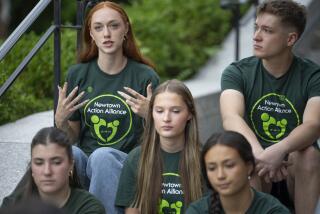Their Words Speak Volumes
- Share via
Shalini Malhotra, 28, delivered a nearly flawless graduation speech.
A nerve-racking task under any circumstances, but in this case, a remarkable feat considering that Malhotra’s entire skull is artificial. Three years ago, the balcony she was standing on collapsed to the ground four floors below, pinning her underneath. Doctors told her family members not to rush to the hospital, she said, because her chance of survival was less than 5%.
“I don’t remember much of the first year,” Malhotra said. “I had to learn the names of objects like a newborn baby.”
Now she has enrolled in a dance class and Internet class at Orange Coast College. She wants to restart her magazine for people of South Asian descent, which had stopped publishing after she was disabled by the balcony crash.
Malhotra’s graduation Wednesday was from the rehabilitation program at Coastline Community College, where she learned how to retrain her memory, process thoughts and speak smoothly.
Just a couple of years before her accident, she had graduated from prestigious Scripps College. But this graduation meant at least as much to her and the 22 other graduates. The two-year program reteaches life skills to people with brain injuries, often from car accidents or strokes.
Each of their stories could provide a lifetime’s worth of humility, grace and perspective.
Stephanie Kirmaci was once a supermom, chauffeuring her two kids around in a minivan without a minute to spare. Then, three years ago, the Huntington Beach woman suffered a stroke, along with Churg-Strauss syndrome, a rare circulatory disease.
“Can you imagine not being able to recall the names of your husband, children and friends?” the 51-year-old woman said, with long pauses between each word. “Talk about frustration.”
She enrolled in the program later, very reluctantly. It was easier, she said, to continue letting her husband speak for her, to walk around silent.
But after training her memory, learning to speak again, and most important, seeing a complete boost in her self-esteem, Kirmaci has much higher aims now.
“My biggest desire is to get back to tutoring,” she said, halting between each word. “I will be talking in five years. . . . I am like the little engine that could.
“I can’t wait to tap dance,” she added, rocking her shoulders and strawberry blond hair. “I can’t wait to go on dates with my husband.”
The audience, including her husband and one of her children, roared, rising to their feet, many with tears in their eyes.
Among the speakers Wednesday, though she still has one more year to go in the program, was Amanda Arthur, whose case drew public attention two years ago when she was severely injured in an accident involving several teenagers in a speeding vehicle, all of them about to graduate high school. A youth was killed in the crash.
When Arthur first entered the Coastline Community College rehabilitation program last fall, her teacher found her confused and disoriented. For months, a special aide sat next to Arthur, turning to the correct pages, pointing to the right material.
“I don’t think she even knew where she was,” teacher Debbie Desmond recalled.
But Wednesday afternoon, confidence and life radiated from Arthur’s petite frame.
“My mind is telling me I will walk again,” she said, with only slight pauses, her head lifted high. “I will drive again. And more importantly, I will run again. I will cross the finish line, and with God’s love, I will be able to do anything.”
Not only did the graduates work through the physical tasks of learning to walk and talk and laugh again, teachers said, but they also made the larger leap of accepting the fact that things just won’t be the same again.
The graduates reminded people in the audience that yes, accidents can leave lawyers crippled for life. Yes, strokes strike people with advanced college degrees.
Among this group, nothing is taken for granted now.
Arthur’s teacher remembered one moment from a few months ago. She asked her students to turn to pages in their two notebooks. As she walked to the back of the room to Arthur’s desk, she expected she would have to correct her, as she had done for the last several months.
“But she had the correct page,” Desmond said. “I had to give her my humblest apologies. It was great. The class shouted, ‘Yeah, Amanda!’ ”
Slowly, they’re making progress.
“Life is good,” Arthur said. “Life was better before, but it can be great again.”
More to Read
Sign up for Essential California
The most important California stories and recommendations in your inbox every morning.
You may occasionally receive promotional content from the Los Angeles Times.













